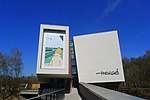Louvain-la-Neuve

Louvain-la-Neuve (French pronunciation: [luvɛ̃ la nœv] , French for New Leuven; Walloon: Li Noû Lovén) is a planned town in the municipality of Ottignies-Louvain-la-Neuve, Wallonia, Belgium, situated 30 km southeast of Brussels, in the province of Walloon Brabant. The town was built to house the Université catholique de Louvain (UCLouvain) which owns the entire territory of the town; following the linguistic quarrels that took place in Belgium during the 1960s, and Flemish claims of discrimination at the Catholic University of Leuven, the institution was split into the Dutch language Katholieke Universiteit Leuven (KU Leuven), which remained in Leuven, and the Université catholique de Louvain. To a great extent, it still lives following the rhythms of the university that is its raison d'être. However, with the construction of L'Esplanade shopping complex, the Aula Magna exhibition centre and auditorium, a large cinema complex, and five museums, it is beginning to grow beyond its academic roots.
Excerpt from the Wikipedia article Louvain-la-Neuve (License: CC BY-SA 3.0, Authors, Images).Louvain-la-Neuve
Place Montesquieu,
Geographical coordinates (GPS) Address Phone number Website Nearby Places Show on map
Geographical coordinates (GPS)
| Latitude | Longitude |
|---|---|
| N 50.667777777778 ° | E 4.6116666666667 ° |
Address
Bibliothèque de droit
Place Montesquieu 2
1348 (Louvain-la-Neuve)
Walloon Brabant, Belgium
Open on Google Maps








